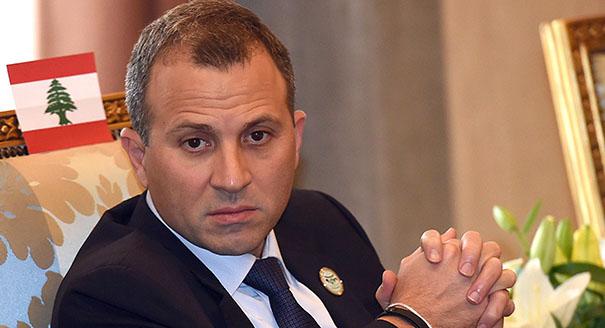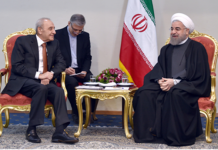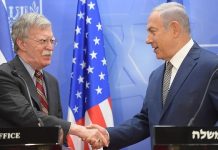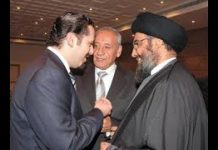وزارة الخزانة الأميركية تعلن فرض عقوبات على جبران باسيل
مايكل يونغ/مركز مالكوم كير-كارنيغي للشرق الأوسط/09 تشرين الثاني/2020
Gebran Bassil Has Been Sanctioned by the U.S. Treasury Department
Michael Young/Malcolm H.Kerr Carnegie MEC/November 09/2020
Gebran Bassil, the head of the Free Patriotic Movement (FPM) and son in law of President Michel ‘Aoun, has been sanctioned by the U.S. Treasury Department’s Office of Foreign Assets Control “for his role in corruption in Lebanon … which builds upon and implements the Global Magnitsky Human Rights Accountability Act.” This is the first designation under the act in Lebanon.
This comes after the Trump administration imposed sanctions last September on two politicians accused of assisting Hezbollah. They were ‘Ali Hassan al-Khalil, a Shi‘a former finance minister and senior aide to the speaker of parliament Nabih Berri; and Youssef Fenianos, a Christian former minister of public works and transportation, who is a member of Suleiman Franjieh’s Marada Party.
Why Is It Important?
Bassil is one of Lebanon’s most senior politicians and is the leader of Lebanon’s largest Christian party, with a very significant bloc in parliament. Bassil has long been on the United States’ target list for his party’s alliance with Hezbollah, so it is interesting that he was sanctioned under legislation designed primarily to highlight corruption. This was, partly, an effort to underline U.S. support for the popular uprising that began over a year ago in Lebanon, and that was directed against the systematic and widespread theft of state assets carried out by Lebanon’s political leadership.
However, Bassil’s relations with Hezbollah were also never far from U.S. thinking. To the Americans, the FPM provides valuable Christian cover for Hezbollah, which has sought to anchor its dominant role in Lebanon through cross-sectarian alliances such as the one with Aoun’s followers. The Trump administration seems to believe that by targeting Bassil, it might be able to peel him and his party away from Hezbollah, which will be gradually more isolated.
By going after Bassil, the Trump administration is also effectively going after Michel ‘Aoun. He was largely responsible for shepherding the political rise of his son in law, who has great influence over the president’s decisions. Indeed, ‘Aoun, who is in his mid-80s, has often acted as a substitute for Bassil in negotiations with other politicians over governmental matters. Sanctioning Bassil is a not-so-subtle way of implying that ‘Aoun has abetted his son in law’s abuses by placing him in ministries in which he could make money illegally.
What Are the Implications for the Future?
Bassil is currently negotiating with prime minister-designate Sa‘d Hariri over his share of portfolios in a new government. Many observers believe he wants to force Hariri into again giving the Energy Ministry to someone close to the FPM, with the financial rents accompanying it. But as Hariri has said his government will be focused on implementing a French plan to revitalize the collapsing economy, he is adamant that no one close to Bassil be named.
This is all the more vital as a large part of the government’s budget deficit comes from the notoriously inefficient and murky electricity sector. If Hariri wants to move forward on an International Monetary Fund package for Lebanon, he has to show a serious intention to reform the ministry. The U.S. sanctions may be aimed partly at forcing Bassil to surrender the energy portfolio. That said, it may have the contrary effect in pushing him to harden his position. Bassil, it seems, would ultimately like to use his control over the Energy Ministry as leverage to secure Hariri’s support for Bassil’s presidency when Michel ‘Aoun’s term ends.
The Energy Ministry is even more important for being, technically, in charge of the highly lucrative offshore natural gas file. Bassil has been flustered by the fact that his great political rival, Nabih Berri, has taken the de facto lead on this front, as he and Hezbollah have agreed to allow Lebanon to negotiate an agreement over its maritime borders with Israel. A successful conclusion would mean that drilling for gas could begin in Bloc 9, which is off southern Lebanon and would likely generate revenues for Berri and Hezbollah in Lebanon’s shady Balkanized patronage system. Bassil and ‘Aoun, in turn, reportedly view their loss of the ministry as tantamount to the end of ‘Aoun’s mandate. But if doing so offers Bassil a way out of his current predicament with Washington, it will be difficult for him to ignore.
Finally, a sanctioned Bassil will face a dilemma. His vulnerabilities could render him more dependent on Hezbollah, but reinforcing his ties with the party would only make it more difficult to break free of the noose the Americans have placed around his neck. Moreover, a sanctioned Bassil is of less use to Hezbollah. As the party looks for a major sectarian ally in Lebanon to help anchor its position locally and internationally, it has much greater interest now in reinforcing its ties with Hariri the Sunni than with Bassil the Christian. That could seriously weaken Bassil in the government formation process as well as undermine what remains of his presidential chances, which were already seriously compromised to begin with.
One thing is clear, however. Many Lebanese will have received news of Bassil’s designation with absolute delight. The FPM leader is one of Lebanon’s most despised politicians, to the extent that during protests last year a popular song directed against him, one of dubious taste, echoed throughout the streets of the country.
وزارة الخزانة الأميركية تعلن فرض عقوبات على جبران باسيل
مايكل يونغ/مركز مالكوم كير-كارنيغي للشرق الأوسط/09 تشرين الثاني/2020
فرض مكتب مراقبة الأصول الأجنبية التابع لوزارة الخزانة الأميركية عقوبات على جبران باسيل، رئيس التيار الوطني الحر وصهر رئيس الجمهورية ميشال عون، “على خلفية الدور الذي لعبه في انتشار الفساد في لبنان… وتأتي هذه العقوبات في إطار قانون ماغنيتسكي العالمي للمساءلة في مجال حقوق الإنسان”، وهو قانون يُطبَّق للمرة الأولى في لبنان.
يُذكر أن إدارة ترامب أدرجت في أيلول/سبتمبر الماضي وزيرين لبنانيين سابقين على قائمة العقوبات الأميركية بتهمة التعاون مع حزب الله، وهما علي حسن خليل، وزير المالية السابق وأبرز مستشاري رئيس مجلس النواب نبيه بري، وهو من الطائفة الشيعية؛ ويوسف فنيانونوس، وزير الأشغال العامة والنقل السابق، الذي ينتمي إلى تيار المردة برئاسة سليمان فرنجية، وهو من الطائفة المسيحية.
لماذا هذا التطور مهم؟
يُعتبر باسيل من أكثر سياسيي لبنان نفوذاً، إذ يترأس أكبر حزب مسيحي في البلاد ويتزعّم كتلة نيابية يُعتدّ بها. وقد وضعته الولايات المتحدة منذ فترة طويلة على القائمة السوداء بسبب تحالفه مع حزب الله، لذا كان ملفتاً أن تعمد إلى فرض عقوبات عليه بموجب قانون صُمِّم خصّيصاً لاستهداف الأشخاص المتورطين في ملفات فساد. رمت هذه الخطوة جزئياً إلى تظهير الموقف الأميركي الداعم للحراك الشعبي الذي انطلق منذ عام ونيّف في لبنان ضد الطبقة السياسية التي مارست عمليات سرقة واسعة وممنهجة لأصول الدولة.
لكن علاقة باسيل مع حزب الله لم تغب عن بال واشنطن أبداً. فهي ترى أن التيار الوطني الحر يوفر غطاء مسيحياً مهماً للحزب، الذي رسّخ دوره المهيمن في البلاد من خلال تحالفات عابرة للطوائف مثل تحالفه مع مناصري عون. لذا ترى إدارة ترامب على ما يبدو أن استهداف باسيل قد يدفعه إلى قطع علاقته هو والتيار مع حزب الله، فيزداد هذا الأخير عزلةً.
واقع الحال أن إدارة ترامب، من خلال فرض عقوبات على باسيل، تستهدف أيضاً ميشال عون. فهو عبّد المسار السياسي لصهره الذي بات يمارس تأثيراً قوياً على قرارات الرئيس. وقد حلّ عون الذي بلغ الخامسة والثمانين من العمر بديلاً عن باسيل أحياناً في المفاوضات مع سائر السياسيين حول المسائل الحكومية. إذاً، يشير تسليط سيف العقوبات على باسيل إلى أن عون تواطأ مع صهره في الانتهاكات عبر تعيينه في وزارات تمكّن فيها من كسب المال غير المشروع.
ما المضاعفات على المستقبل؟
يخوض باسيل راهناً مفاوضات مع رئيس الوزراء المكلّف سعد الحريري حول حصته من الحقائب الوزارية في الحكومة العتيدة. يعتبر الكثير من المراقبين أن باسيل يريد إرغام الحريري على إعطاء وزارة الطاقة لشخص موالٍ للتيار الوطني الحر، لما تدرّه هذه الحقيبة من عوائد مالية. لكن يبدو أن الحريري لا يعتزم تسمية أي شخص مقرّب من باسيل، في إطار التزام حكومته تطبيق المبادرة الفرنسية الرامية إلى إنعاش الاقتصاد اللبناني.
ويرتدي هذا الأمر أهمية أكبر نظراً إلى أن قطاع الكهرباء الذي يفتقر إلى آليات عمل واضحة وفعالة مسؤولٌ عن جزء كبير من عجز الموازنة. وفي حال أراد الحريري الحصول على مساعدة صندوق النقد الدولي، عليه أن يُظهر نية جدية لإصلاح هذه الوزارة. وقد يكون أحد أهداف العقوبات الأميركية إجبار باسيل على التنازل عن حقيبة الطاقة، لكن سينجم عنها ربما نتيجة معاكسة هي أن يزداد تشبّثاً بموقفه. ويبدو أن باسيل يريد استخدام نفوذه في وزارة الطاقة كورقة ضغط على الحريري لضمان دعمه له في السباق الرئاسي عند انتهاء ولاية ميشال عون.
هذا وتتمتّع وزارة الطاقة بأهمية كبرى لأنها مسؤولة من الناحية التقنية عن ملف الغاز الطبيعي البحري المدّر للأرباح. وباسيل مستاء من تسلّم خصمه السياسي اللدود نبيه بري زمام المبادرة على هذه الجبهة، إذ اتفق مع حزب الله على إطلاق المفاوضات من أجل ترسيم الحدود البحرية مع إسرائيل. وقد يتكلّل النجاح في إبرام هذا الاتفاق ببدء التنقيب عن الغاز في البلوك رقم 9 قبالة ساحل الجنوب اللبناني. ويُرجح أن يدّر ذلك أموالاً طائلة لبري وحزب الله في إطار نظام المحسوبية المُبلقن والمشبوه. ناهيك عن أن باسيل وعون يعتبران أن خسارة هذه الوزارة هي بمثابة نهاية لولاية عون. لكن إن كان التنازل عنها يخرج باسيل من مأزقه الحالي مع واشنطن، فقد يضطر إلى التفكير بهذا الاحتمال.
أخيراً، يواجه باسيل معضلة بعد فرض عقوبات عليه: فنقاط ضعفه الحالية قد تجعله أكثر اعتماداً على حزب الله، لكن تعزيز روابطه مع الحزب سيصعّب عليه قطع حبل المشنقة الذي لفّه الأميركيون حول عنقه. كذلك، سيصبح باسيل الخاضع إلى العقوبات أقل فائدة لحزب الله الذي يبحث عن حليف طائفي قوي يساعده في ترسيخ موقعه على الساحة المحلية والدولية. بل باتت للحزب مصلحة أكبر بكثير في تعزيز علاقته مع الحريري السنّي على حساب باسيل المسيحي. وهذا قد يحدّ بشكل كبير من تأثير باسيل في التشكيلة الحكومية، ويقوّض ما تبقى من حظوظه الرئاسية، المتضائلة أصلاً.
لكن ثمة أمر واضح وضوح الشمس، وهو أن الكثير من اللبنانيين استقبلوا بحفاوة نبأ فرض عقوبات على باسيل. فرئيس التيار الوطني الحر هو من أكثر السياسيين المكروهين في لبنان، وبدا ذلك جلياً أثناء احتجاجات العام الماضي حين صدحت أغنية مبتكرة تشتم باسيل وتردّدت أصداؤها في شوارع البلاد كافة.























